
Sleep Rehab Blog
Sleeping Postion for Snorers
August 12, 2020

Weight and Sleep Apnea: Does One Cause the Other?
July 6, 2020
Which comes first, weight gain from lack of sleep or Sleep Apnea caused by weight gain? Well, the truth is, it can be both. In fact, it can become a vicious cycle if not treated quickly. You may not be able to sleep well at night due to Sleep Apnea, and the exhaustion you experience from a restless night disrupts a healthy routine. It’s not new knowledge that carrying around extra weight comes with additional medical issues, and Obstructive Sleep Apnea (OSA) can be one of them.
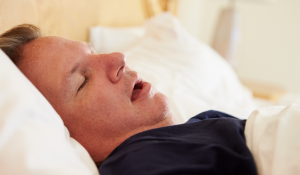
Why Weight Gain Causes Sleep Apnea
Over two-thirds of the U.S. population of the United States is now considered overweight or obese, and it’s estimated that three to seven percent of the U.S. population suffers from Sleep Apnea. So, just because you are overweight does not mean you will develop Sleep Apnea, but it does significantly increase your chances if you do have some additional pounds on you.
The reason for this is, that the excess fat that accumulates around the neck area can obstruct breathing, ultimately leading to a diagnosis of Sleep Apnea.
Why Sleep Apnea Causes Weight Gain
Not getting an adequate amount of sleep nightly not only makes you less attentive and reactive, but it can cause weight gain. Lack of sleep changes your hormone levels related to your appetite, and in the increase in hunger makes you eat more than you normally would or even need. Not waking up rested can also cause you to put off healthy habits like a morning jog. The last thing anyone wants to do when they are exhausted is go for a long walk.
So how do you stop this cycle from becoming worse and worse? Make an appointment for a consultation with our experts at Sleep Rehab. We have the right tools to help you sleep better and feel better.
Not Sleeping Well During the Pandemic? Try These 3 Tips
May 27, 2020
As busy and sleep-deprived as our lives were pre-COVID-19, there have been mass accounts of sleep issues during this pandemic. Have you been experiencing trouble sleeping during the last two months? Well, rest assured (pun intended) that you’re not alone! Nothing could prepare us for the anxiety, uncertainty, and worry that comes with a global crisis.

However, getting adequate shut-eye with a rampant virus is going on is critical. Sleep boosts your immune system, strengthens your body’s defense system and can even aid in making vaccines (when it comes available) more effective.
In addition to positive effects for the body, a solid night’s rest can improve mood and brain function. We’re so used to making plans and constantly moving, so being asked to slow down and deal with an uncertain future can make you feel anxious and potentially depressed. In other words, we can use all of the mood enhancers we can get!
What can you do to get back to a night of healthy sleep?
Set your schedule.
Set a routine wake-up time even if you’re working from home or currently unemployed. It’s crucial to keep your body on a steady schedule. This also means making time to wind down before bed and going to bed around the same time every night.
Reserve your bed for bedtime.
Working from home means you can probably work anywhere in your house, but leave the work out of the bedroom. Your brain needs to be able to separate work from rest.
Stay active.
Make sure to get outside and go for a walk, jog or bike ride to release your mind of any anxiety and stress related to the pandemic. This will help you sleep better at night!
Like everything, this too shall pass. But in the meantime, take care of your mind and body. If you need additional help sleeping, contact Sleep Rehab for a consultation. We’re here for you!
Worried You Can’t Sleep for Your Sleep Test? Try These 3 Tips
March 3, 2020

When you see a sleep dentist to have your sleep apnea treated, the first thing they’ll need to do is perform a sleep test. You’ll wear a special device at home that will measure your vital signs while you’re asleep in order to narrow down whether or not you have a sleep disorder. Of course, the test does have one weakness: what if you can’t fall asleep? It’s very common for patients to spend more time awake than usual when they’re concentrating too much on their need to sleep, and that could affect the results. The good news is that you can plan ahead. Read on to learn 3 tips for avoiding a sudden case of insomnia when you have a sleep test to complete.
Your Brain Without Sleep
The alarm goes off. You hit snooze. Can it really be time to get up already? After a night full of tossing and turning and barely getting a total hour of sleep, it’s going to be a rough day. But as much as you feel like you won’t be able to keep your eyes open during the day, it’s not just your body that is exhausted, your brain is too and you might not be as sharp as you need to be today.
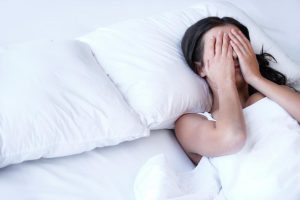
How Sleep Apnea Stops You from Having Sweet Dreams
February 5, 2020
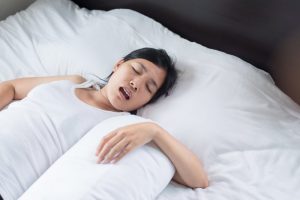 Dreams are part of the sleep cycle and are thought to be important to your mental and emotional health; if you haven’t been able to remember them lately, it might be a side effect of a serious sleep disorder. According to a study in the Journal of Clinical Sleep Medicine, only 43.2 percent of patients with obstructive sleep apnea are able to recall their dreams – and the reason most likely has to do with how the condition disrupts the quality of your rest. Read on to learn why you may need to have your sleep apnea treated before you can enjoy sweet dreams again.
Dreams are part of the sleep cycle and are thought to be important to your mental and emotional health; if you haven’t been able to remember them lately, it might be a side effect of a serious sleep disorder. According to a study in the Journal of Clinical Sleep Medicine, only 43.2 percent of patients with obstructive sleep apnea are able to recall their dreams – and the reason most likely has to do with how the condition disrupts the quality of your rest. Read on to learn why you may need to have your sleep apnea treated before you can enjoy sweet dreams again.
Can Sleep Apnea Affect My Other Medical Conditions?
February 4, 2020
A true Sleep Rehab patient story, originally published on YouTube
Mrs. Dillard wasn’t feeling very rested in the morning and was snoring more often than before, as reported by her husband. In addition to some allergies she was experiencing, she went in for a consult with her Ear, Nose, and Throat (ENT) doctor. The ENT doctor, after a check-up, noticed some irregularities in her current medical condition thus recommending a professional sleep test by Sleep Rehab. She and her husband both came into the Sleep Rehab office for Mrs. Dillard’s first sleep test, and sure enough, Sleep Apnea was diagnosed.
However, she wasn’t the typical patient that Dr. Fedosky usually sees, because of her lack of the usual symptoms – Mrs. Dillard wasn’t crippling exhausted upon waking, nor was her snoring out-of-control and unbearable. But, her Sleep Apnea was in fact, making her other medical conditions worse and there was no question that it needed to be fixed.
Sleep Apnea can worsen other medical conditions like, but not limited to:
- Propensity for strokes
- High blood pressure
- Arrhythmia of the heart
- Heart disease
So, by controlling Sleep Apnea, you can also potentially control these other medical conditions, as they can be linked.
We are happy to report that after working with Dr. Fedosky and the Sleep Rehab team, Mrs. Dillard was relieved of her former tiredness and even snoring (which makes for a very happy husband!) and her Sleep Apnea is now controlled.
See the full patient story of Mr. and Mrs. Dillard below! Do you identify with Mrs. Dillard and interested in having a sleep test performed? If you believe you may be experiencing unusual symptoms for Sleep Apnea or looking for a doctor that can help you, contact Dr. Fedosky at Sleep Rehab today.
3 Reasons Why You Should Have a Sleep Test Done
January 28, 2020
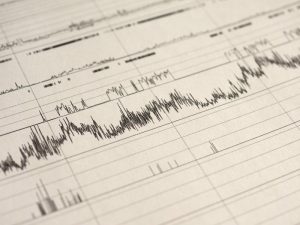 If a sleep dentist or doctor thinks you might have sleep apnea or a similar disorder, they might recommend a sleep test. This can mean staying at a lab overnight, or it might mean taking a special device home to wear while you sleep; in either case, the test will record your brain waves, measure the oxygen levels in your blood, and keep track of your heart rate and breathing – all of the necessary information to make a proper diagnosis. Are you not sure whether a sleep test is worth the trouble? Here are 3 reasons why it could have a very real impact on your sleep health.
If a sleep dentist or doctor thinks you might have sleep apnea or a similar disorder, they might recommend a sleep test. This can mean staying at a lab overnight, or it might mean taking a special device home to wear while you sleep; in either case, the test will record your brain waves, measure the oxygen levels in your blood, and keep track of your heart rate and breathing – all of the necessary information to make a proper diagnosis. Are you not sure whether a sleep test is worth the trouble? Here are 3 reasons why it could have a very real impact on your sleep health.
New Study: Correlation Between Age Acceleration & Sleep Apnea
December 30, 2019
As a sufferer of Obstructive Sleep Apnea (OSA), you might be experiencing quite a few side effects including trouble breathing in the middle of the night, waking up unusually exhausted, and others. However short-lived those effects may be, there are other effects of not sleeping through the night that may cause long-term damage, including your lifespan.
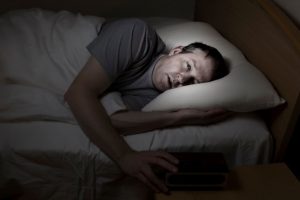
Image via abc.net.au
Could untreated sleep apnea result in shaving years off of your life? According to a 2019 study by Oxford, it certainly could.
In this article titled, Sleep Disordered Breathing Associated with Epigenetic Age Acceleration, tested with 53% female and 47% male and an average age of 67.8 found that disruption in your breathing while asleep not only changes your circadian rhythm causing exhaustion, but it also aids in age acceleration.
The scientists that published the article concluded: “Increasing SDB (sleep disordered breathing) [a side effect of OSA] severity and sleep disruption was associated with epigenetic age acceleration, independent of measured confounders.”
Epigenetics refers to the changes that can happen in DNA because of lifestyle and environmental factors that can affect how genes behave. When you don’t get enough sleep, your DNA could be aging faster than it normally would.
In the study, one of the authors stated, “Traditionally, we don’t give as much attention to sleep as we do to exercise or smoking,” says Dr. Li. “But it’s another modifiable risk factor, like smoking, physical inactivity, or poor diet.”
The good news is, epigenetic aging is reversible when treated and could improve cardiovascular and neurobehavioral health.
“Although there is no cure for sleep apnea, recent studies show that successful treatment can reduce the risk of heart and blood pressure problems.” – National Institute of Neurological Disorders and Stroke
At Sleep Rehab, located in the Dallas area, we can provide treatments that have proven time and time again to treat your sleep apnea with the possibility to slow the age acceleration that OSA has caused. These treatments are non-invasive, non-pharmaceutical and non-surgical. No CPAP required. Contact us today to learn more and get started.
Everything You Need to Know About Life with Sleep Apnea
December 28, 2019
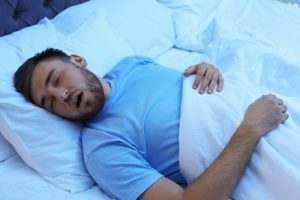 After your partner complained that your loud snoring forced them to sleep in another room, you decided to find a sleep expert for treatment. Unfortunately, after tests have been conducted, they told you that it’s not just regular snoring; it’s a side effect of sleep apnea. What is this disorder, and what will it mean for your nightly slumber and your overall health now that you have it? Here’s everything you’ll need to know about this potentially dangerous condition.
After your partner complained that your loud snoring forced them to sleep in another room, you decided to find a sleep expert for treatment. Unfortunately, after tests have been conducted, they told you that it’s not just regular snoring; it’s a side effect of sleep apnea. What is this disorder, and what will it mean for your nightly slumber and your overall health now that you have it? Here’s everything you’ll need to know about this potentially dangerous condition.
